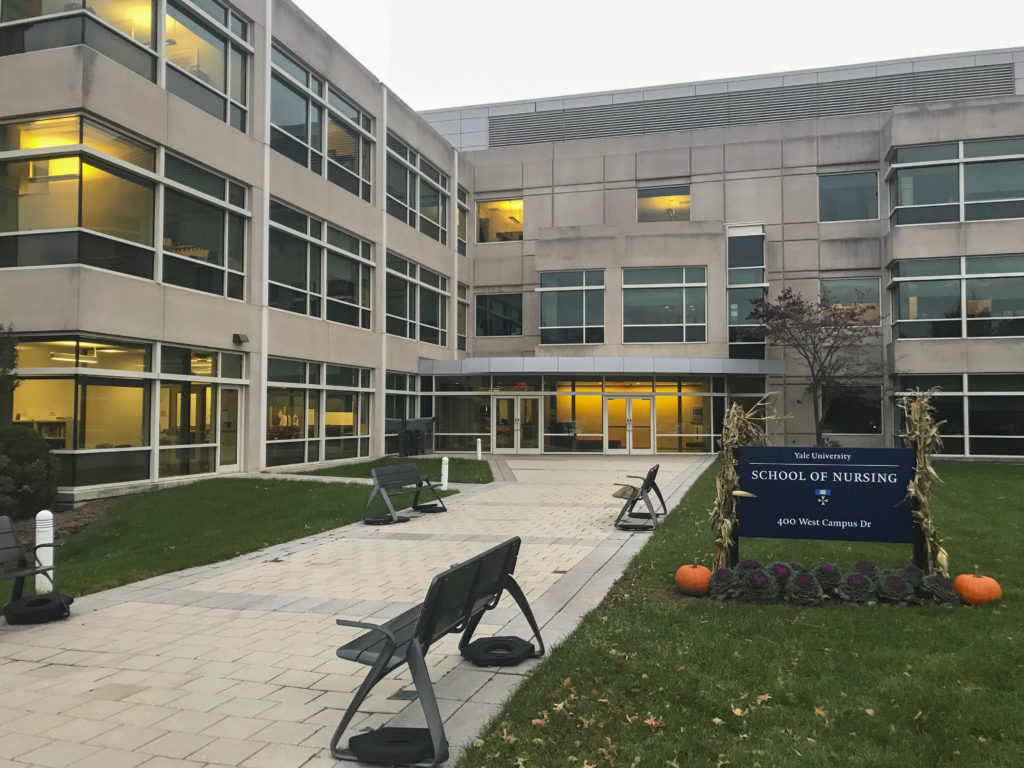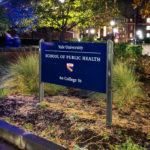Racist Zoom-bombing occurs during YSN event
At a Zoom event co-sponsored by various student affinity groups at the Yale School of Nursing on April 12, a racist Zoombombing occurred during a conversation about racism in healthcare.

Nick Tabio, Contributing Photographer
On April 12, the Yale School of Nursing’s Office of Student Life and Belonging, alongside many other student affinity groups, hosted guest speakers Ericka Hart and Da’Shaun Harrison to talk at an event called “Radical Wellness: Reimagining Health Through a Black Liberation Lens.” However, with 15 minutes left in the event, a racist Zoom bombing occurred.
The event was organized by Shiliu Wang NUR ’23 and Tayisha Saint Vil NUR ’23, two student leaders at the nursing school who work to provide programming to the School in social justice and diversity, equity and inclusion. Wang works at the Office of Student Life and Belonging, which develops programming for their cohort and community that provides intersectional analysis on issues of racial, economic and social justice within systems of health care. Saint Vil works on the IDEAS Council, a de facto Diversity, Equity and Inclusion, or DEI, student body. Ronica Mukerjee, the program coordinator and creator of the Gender and Sexuality Health Justice concentration, moderated the discussion. The Zoom event had 333 registrants and between 200 to300 attendees at the point of maximum attendance.
Right when the Q&A session with the audience had started, and Hart was answering a question about DEI spaces, the Zoom bomber started writing the n-word in all caps in the chat. The person, who used a fake name and had their video off, managed to get unmuted, and for about two seconds, uttered the slur a couple of times, according to Wang. Wang said that by then, the moderators managed to boot the person off of the call.
“It was a great event until that moment happened,” Saint Vil said. “Immediately I felt shock, like how do you continue to host an event when this bomb just kind of went off? Here are these amazing community activists and experts that did us the favor of coming to speak with us and engage with us. … The event was a day or two after the trial of the murder of George Floyd, so tensions were already high, and for that to take place and for people who are not even part of the Yale community to be subjected to this made me feel like we failed everyone and our guests. As an organizer, I especially felt powerless in the situation and my identity was part of this attack.”
The event was advertised on YaleConnect and was open to mainly students at the University; however, guests without central authentication service, or CAS, or a YaleNetID can log into YaleConnect and access the registration page. People who registered for the event could only access the Zoom link after confirming registration, but there was no waiting room or screening of email addresses when participants joined the event.
Wang was excited to bring “brilliant Black queer nonbinary thinkers and visionaries” to tackle issues of fatphobia and its intersection with anti-Blackness, disability justice and other important topics that are not discussed within the curriculum framework of the nursing school.
According to Wang, this discussion was meant to interrogate the binaries that exist within health care, such as what is considered normal versus abnormal, and examine what purpose they serve. Hart and Harrison urged the audience, as people training to become health care providers, to think about what their responsibilities are in working to dismantle those binaries and power structures.
They put a lot of effort into organizing the event, and the Zoom bombing was unexpected and violent, Wang and Saint Vil said. Still, Wang praised the guest speakers for how they handled it after the initial incident.
“It was obviously disgusting and violent and shocking,” Wang said. “I think the way that Da’Shaun and Ericka pivoted from it was very powerful in the ways that they named this as a prime example as to what they meant about just how uncreative white supremacy is. Also, you don’t see Zoom bombers attacking events of white people and white speakers, but when you have an event that has the title of Black Liberation in it, and it’s a space where queer Black folks are coming together to talk about these issues, those are the events that get targeted.”
This event was not the first instance of racism at the nursing school, nor was it the first racist Zoom bombing at the nursing school or at the University. In part due to a racist Zoom bombing in 2020, professor Dena Simmons resigned from Yale, citing a racist and hostile culture at the nursing school. In late February, malicious Zoom-bombing attacks occurred at two events sponsored by the Office of LGBTQ+ resources.
Ashleigh Evans NUR ’23, the new co-president of the Yale School of Nursing Student Government Organization alongside Saint Vil, predicts that a Zoom bombing will “happen again,” and that this behavior will not cease in the near future.
Evans found the lack of adequate response to the most recent Zoom bombing disappointing, and thinks Yale should be accountable for not using its vast resources to provide cybersecurity and IT support to prevent attacks like this from occurring.
“The fact that we pay so much money to be here — everybody should be disgusted that this is being committed in our community,” Evans said. “It is happening to marginalized people. Yale should be putting out statements about how and what cybersecurity and the IT team is doing to prevent these events in the future. What I perceive to be happening is that because it is happening to marginalized racial identities, because it’s happening to the LGBTQ community, it’s thought of as okay. These are the people that it can happen to, for it to be swept under the rug. Not addressing a pattern of Zoom bombings is not acceptable.”
Yale School of Nursing Dean Ann Kurth had condemned the racist incident in her email sent to the nursing school community on the day of the event and repeated these sentiments in an email to the News.
“Yale School of Nursing (YSN) condemns this racist incident in the strongest possible terms,” Kurth wrote in an email to the News. “Racist slurs have no place in our learning environments. It was an abhorrent and — as event panelist Ericka Hart said — a cowardly act.”
In her email, Kurth highlighted information on resources for support through the Mental Health and Counseling liaison for the nursing school. According to Kurth, members of the Yale School of Nursing Offices of Student Life and Belonging and Diversity, Equity and Inclusion reached out to student organizers to offer support to them as well.
Evans said that this incident has prepared her to be extra vigilant when hosting Zoom events in the future for student activities at the nursing school. She proposed creating public guidelines for moderator roles with respect to ensuring all guests in the Zoom are registered and affiliated with the nursing school.
“I had a series of Black history events, and I moderated and there was someone who all they did was comb through people’s names, and if she didn’t recognize a name, you couldn’t come to the event,” Evans said. “That’s absurd, but if that’s what YSN ends up doing, protocol needs to be put out that there needs to be two moderators, one person who screens and one person who moderates.”
Still, Evans was especially concerned that the nameless and faceless Zoom bomber, who could have been a part of the Yale community, suffered no consequences from their hate speech.
Evans said that the YaleConnect registration link was initially only sent within the nursing school and African American communities, making it appear likely to her that the Zoom bomber was affiliated with the University.
“It outrages me that two students of color put so much passion and energy and time into a project, and see someone who was clearly part of our community mess it up and not face any consequences for their actions,” Evans said.
Kurth wrote that she reported the incident that evening to the Yale Police Department and “coordinated” with Afro-American Cultural Center Dean Risë Nelson and Assistant Director Sofia Lackiran to provide additional information to YPD.
“The YPD has delivered a search warrant to Zoom to try to determine the identity of the person who committed this act,” the email reads. “Dean Kurth also worked with Elizabeth Conklin, AVP for Institutional Equity, Access and Belonging, including circulating the Poorvu Center’s best practices for Zoom meetings.”
Both Saint Vil and Evans said that it is important that Yale takes action and invests direct resources toward the prevention of these events in the future. Saint Vil especially pointed out that the pandemic has created a new push for treating cybersecurity as a pertinent issue.
“I think it’s just as important that we protect folks [on the Internet] in the same way people’s bodies are protected physically,” Saint Vil said.
As for improving cybersafety, Kurth agreed that the incident was a reminder to remain vigilant in conducting Zoom meetings. She said that members of the nursing school community who plan events had previously received best practices guides on using the platform, which include enabling waiting rooms and limiting event registration. A guide is posted on Yale’s website.
“Cybersecurity policies and best practices that ensure the emotional and physical safety of our university community, particularly structurally marginalized community members, is an important goal for YSN and the whole of the university,” Kurth wrote.
Still, Wang, Saint Vil and Evans believe that although the nursing school put out an anti-racism statement and has a social justice mission of “better health for all,” the nursing school administration has not actually taken tangible steps towards changing the culture for Black and other marginalized students. Incidents like Zoom-bombings should not be happening to begin with, according to Saint Vil.
“I think there is a lack of transparency for me as a student to really understand what is happening to meaningfully address these incidents,” Saint Vil said. “The most I see are emails and apologies and things like that that feel very surface-level.’
Kurth reiterated that the Yale School of Nursing Offices of Student Life and Belonging and Diversity, Equity and Inclusion are available to any nursing school student or participant who felt harm in the aftermath of this “despicable event.”
The Gender and Sexuality Health Justice concentration at Yale is a subspecialty program at the Yale School of Nursing.









